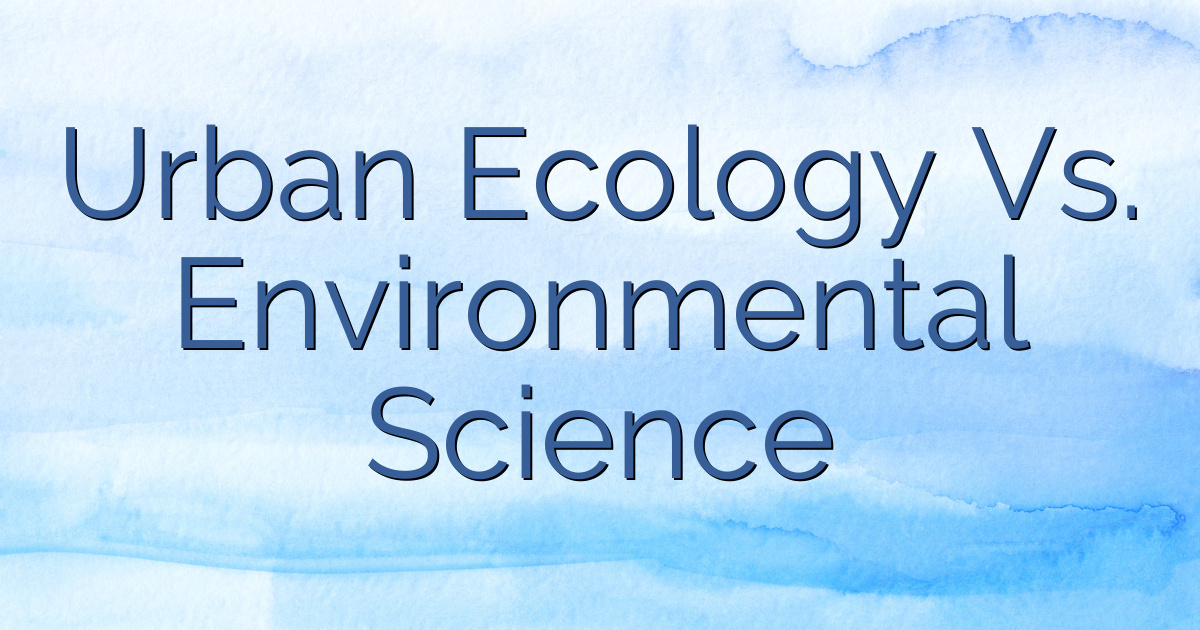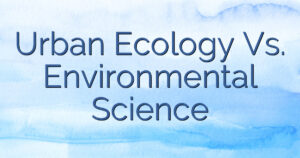 Are you considering a major in either Urban Ecology or Environmental Science? It can be a tough decision, but don’t worry – we’ve got you covered.
Let’s start by looking at a real-life example to help you understand the differences between these two majors. Imagine you’re studying the impact of urbanization on local bird populations.
In Urban Ecology, you’d focus on how urban environments affect bird behavior and habitat.
In Environmental Science, you’d take a broader approach, examining the overall environmental impact of urbanization.
So, which path will you choose? Let’s dive in and find out.
Are you considering a major in either Urban Ecology or Environmental Science? It can be a tough decision, but don’t worry – we’ve got you covered.
Let’s start by looking at a real-life example to help you understand the differences between these two majors. Imagine you’re studying the impact of urbanization on local bird populations.
In Urban Ecology, you’d focus on how urban environments affect bird behavior and habitat.
In Environmental Science, you’d take a broader approach, examining the overall environmental impact of urbanization.
So, which path will you choose? Let’s dive in and find out.
Table of Contents
Key Takeaways
- Urban ecology focuses on studying the relationship between humans and urban ecosystems, while environmental science focuses on the natural environment and human activities.
- Both disciplines emphasize critical thinking and problem solving skills, with a focus on understanding the impact of urban development on ecosystems and the interrelationships between humans and the environment.
- Career opportunities in environmental science include roles such as environmental scientist, conservation biologist, environmental engineer, sustainability consultant, and environmental policy analyst.
- Salary potential varies across different job roles in environmental science, with factors such as experience, location, and industry influencing earning potential.
Overview of the two majors: Environmental Biology
If you’re considering majoring in Environmental Biology, you’ll find that it focuses on studying the relationship between living organisms and their environment. This major offers a wide range of research opportunities for students interested in understanding the complexities of the natural world. One of the key aspects of Environmental Biology is the emphasis on fieldwork experiences. As an Environmental Biology major, you’ll have the opportunity to conduct research in various ecosystems, such as forests, wetlands, or coastal areas. This hands-on approach allows you to gain practical skills in data collection, analysis, and interpretation. Additionally, fieldwork experiences provide a unique perspective on the ecological challenges faced by different habitats and species. Overall, Environmental Biology offers an exciting and rewarding academic journey for those passionate about exploring and preserving the natural world.Overview of the curriculum and courses offered
The curriculum for this program includes a variety of courses that provide an overview of the topics covered. In the field of urban ecology and environmental science, fieldwork plays a crucial role in understanding the complex dynamics of urban ecosystems. By conducting fieldwork, you will gain hands-on experience in collecting data, analyzing samples, and observing the interactions between organisms and their urban environment. This practical aspect of the curriculum allows you to apply the theories learned in the classroom to real-world situations. Additionally, the integration of technology in the curriculum enhances your understanding of urban ecology and environmental science. Through the use of Geographic Information Systems (GIS), remote sensing, and other technological tools, you will be able to analyze and visualize data more efficiently, ultimately contributing to a more comprehensive understanding of urban ecosystems.Overview of coursework and assessments in Urban Ecology Vs. Environmental Science
You’ll find that the coursework and assessments in this program provide a comprehensive understanding of the dynamics of urban ecosystems and their impact on the environment. When comparing the coursework differences between urban ecology and environmental science, it becomes evident that both programs cover similar foundational topics such as ecology, conservation, and sustainability. However, urban ecology places a greater emphasis on studying the interactions between humans and urban ecosystems, including topics like urban planning, green infrastructure, and social aspects of urbanization. On the other hand, environmental science focuses more broadly on the study of the natural environment and its interactions with human activities. In terms of assessment methods, both programs utilize a combination of written assignments, laboratory work, field research, and exams to evaluate students’ understanding of the subject matter. Additionally, both programs often incorporate group projects and presentations to enhance students’ communication and teamwork skills.Comparison of Skills Developed: Critical Thinking and Problem Solving
When comparing the skills developed in both programs, it’s important to note that critical thinking and problem solving are emphasized in both urban ecology and environmental science. Both disciplines require students to analyze complex environmental issues, evaluate different perspectives, and propose innovative solutions. In urban ecology, students learn to assess the impact of urban development on ecosystems, identify potential environmental challenges, and devise strategies for sustainable urban planning. Similarly, environmental science students develop the skills to understand the interrelationships between humans and the environment, and find ways to mitigate and adapt to environmental change. These critical thinking and problem-solving skills are highly valuable in the job market, as they open up various career opportunities in fields such as environmental consulting, policy-making, and research. Additionally, individuals with strong critical thinking and problem-solving abilities often have higher salary potential in these fields due to their ability to solve complex environmental challenges.Comparison of Career Opportunities and Job Roles in Environmental Science
Consider the variety of career paths and job roles available in the field of environmental science. The field of environmental science offers diverse and rewarding career opportunities, allowing you to make a positive impact on the environment and society. Here are some exciting job roles to consider:- Environmental Scientist: Conduct research and collect data to assess and analyze environmental issues.
- Conservation Biologist: Work to protect and preserve ecosystems and endangered species.
- Environmental Engineer: Design and implement solutions to minimize and manage environmental impacts.
- Sustainability Consultant: Advise organizations on sustainable practices and help them reduce their environmental footprint.
- Environmental Policy Analyst: Influence policy decisions by evaluating and recommending environmental regulations.
Comparison of Salary Potential in Environmental Science Careers
If you’re interested in pursuing a career in environmental science, it’s important to research and compare salary potential across different job roles. Understanding the salary potential can help you make informed decisions about your career path and financial goals. Below is a comparison of salary potential across five common job roles in environmental science:| Job Role | Average Salary (USD) |
|---|---|
| Environmental Scientist | $70,000 |
| Environmental Engineer | $85,000 |
| Environmental Consultant | $75,000 |
| Conservation Scientist | $61,000 |
| Sustainability Specialist | $65,000 |
Similarities between Urban Ecology and Environmental Science Careers
There are several commonalities between careers in urban ecology and environmental science. Both fields focus on studying the interactions between organisms and their environment, with a particular emphasis on understanding how human activities impact ecosystems. Here are some key similarities:- Fieldwork: Both urban ecologists and environmental scientists spend a significant amount of time conducting fieldwork to collect data and monitor environmental conditions.
- Data analysis: Both careers require strong analytical skills to interpret and analyze the data collected from fieldwork or experiments.
- Policy and advocacy: Professionals in both fields often play a role in influencing environmental policies and advocating for sustainable practices.
Difference between Urban Ecology and Environmental Science Majors
One major distinction between the majors is the focus on studying human impact on ecosystems in environmental science, while urban ecology focuses on the study of organisms and their environment in urban areas. In terms of job prospects, both majors offer various opportunities in research, conservation, and consulting. However, environmental science graduates may have a wider range of career options, as their knowledge extends beyond urban environments. They can work in fields such as climate change, natural resource management, and environmental policy. On the other hand, urban ecology graduates are specialized in understanding the unique challenges and dynamics of urban ecosystems. Their expertise may be particularly valuable in addressing issues like urban pollution, green infrastructure, and urban planning. Despite these differences, both majors share similarities in coursework, including classes on ecology, environmental science, and data analysis. Both majors also emphasize the importance of fieldwork and hands-on experience in their respective disciplines.Factors to consider when choosing between Urban Ecology and Environmental Science majors
When choosing between the majors, you should consider factors such as your career goals, personal interests, and the specific courses offered in each program. Urban Ecology and Environmental Science are both exciting fields, but they differ in their focus and job prospects. In Urban Ecology, you will study the complex relationships between humans and their urban environment. This major prepares you for careers in urban planning, sustainable development, and environmental consulting. On the other hand, Environmental Science focuses on the broader study of the environment and its impacts on human health and ecosystems. This major opens up opportunities in fields such as environmental research, conservation, and policy-making. To help you make an informed decision, here is a comparison of the two majors:| Urban Ecology | Environmental Science |
|---|---|
| Focuses on urban environments | Studies the broader environment |
| Emphasizes human-environment interactions | Explores impacts on human health and ecosystems |
| Careers in urban planning, sustainable development, and environmental consulting | Opportunities in environmental research, conservation, and policy-making |
What is the Difference Between Urban Ecology and Environmental Science?
Urban ecology and environmental science both study the interactions between organisms and their environment, but with different focuses. Urban ecology looks specifically at how organisms adapt to urban environments, while environmental science encompasses a broader range of environmental issues. Conservation biology addresses the preservation of biodiversity in urban ecology.

